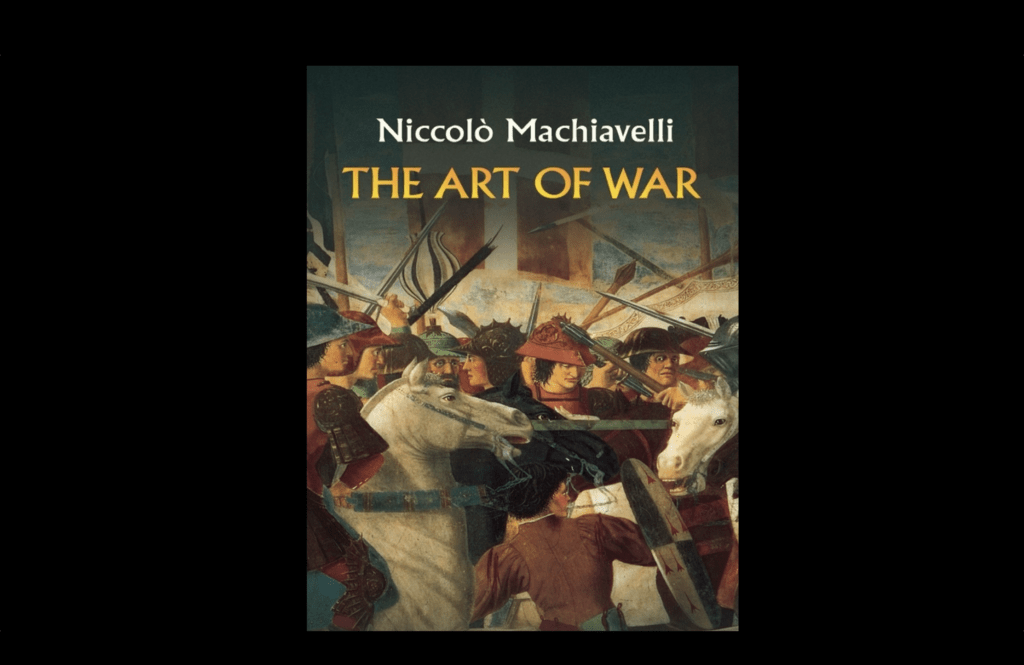While Niccolò Machiavelli’s The Art of War may not enjoy the same renown as The Prince, its insights into the nexus of military organization and political stability have influenced subsequent military leaders and strategists over the centuries.
Machiavelli’s The Art of War is a seminal dialogue that delves into the interplay between warfare and politics, advocating for the establishment of a citizen militia and the emulation of ancient Roman military practices. Presented as a conversation in the Orti Oricellari gardens of Florence, the principal speaker, Fabrizio Colonna—a seasoned condottiere—articulates Machiavelli’s perspectives on military organization and civic virtue.
“Without doubt, ferocious and disordered men are much weaker than timid and ordered ones. For order chases fear from men and disorder lessens ferocity.”
Machiavelli’s advocacy for citizen armies and his analysis of power dynamics remain pertinent, offering enduring lessons on leadership, strategy, and governance.
Citizen Militias vs. Mercenaries
Machiavelli critiques the reliance on mercenary forces, viewing them as unreliable and self-serving. He posits that a state’s military strength should rest upon its own citizens, asserting that “nature creates few men brave; industry and training makes many”.
The dialogue emphasizes the symbiotic relationship between military discipline and societal well-being. Machiavelli contends that the principles governing military organization are applicable to civil governance, emphasizing that “discipline in war counts more than fury”.
“To know how to recognize an opportunity in war, and take it, benefits you more than anything else.”
From Napoleon to von Clausewitz
Various leaders in history have found Machiavelli’s insights into military strategy and the relationship between war and politics to be valuable guides in their own military ventures.
For Maurice of Nassau (1567–1625), the Prince of Orange, Machiavelli’s influence was instrumental in the military revolution of the late 16th and early 17th centuries. He implemented rigorous drill techniques and linear formations, reflecting Machiavelli’s advocacy for disciplined, well-trained troops. Maurice’s reforms emphasized the importance of infantry and the use of standardized weapons, aligning with Machiavellian principles of military organization.
Known as the “Father of Modern Warfare”, Gustavus Adolphus of Sweden (1594–1632) introduced innovative tactics during the Thirty Years’ War. He emphasized mobility, the use of combined arms, and flexible formations. These strategies resonate with Machiavelli’s emphasis on adaptability and the integration of various military units to achieve tactical superiority.
The Prussian general and military theoristCarl von Clausewitz (1780–1831), best known for his work On War, was also influenced by Machiavellian thought. Clausewitz’s concept of war as a continuation of politics by other means reflects Machiavelli’s assertion that war is an extension of political activity. Both theorists recognized the intrinsic link between military strategy and political objectives.
Napoleon Bonaparte’s (1769–1821) military campaigns demonstrated principles akin to those found in The Art of War. His emphasis on swift, decisive action and the strategic use of deception mirrors Machiavelli’s advice on the conduct of war. Napoleon’s ability to adapt to changing circumstances and his focus on the morale and training of his troops reflect Machiavellian ideals.
The King of Prussia, Frederick the Great (1712–1786) was known for his military innovations and strategic prowess. Frederick’s use of flanking manoeuvres and oblique order attacks can be seen as practical applications of Machiavelli’s discussions on battlefield tactics and the element of surprise.
In line with what he says in his better-known and more widely read The Prince, Machiavelli argues that war is a natural and necessary tool of politics. He’s clear that “war must be expressly defined” – it’s simply politics carried on by other means. The Art of War doesn’t outshine The Prince, but it’s still well worth a read for anyone with a serious interest in military thinking.



